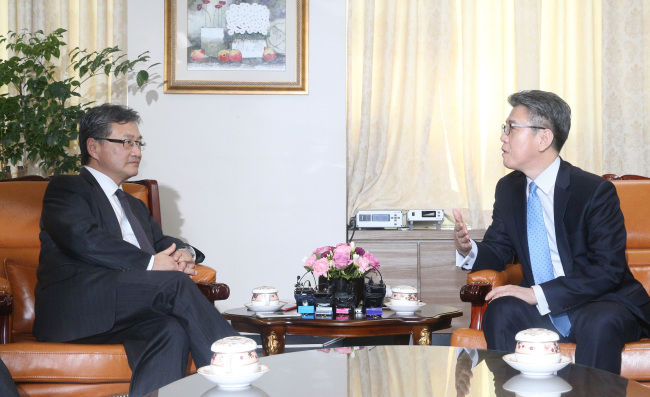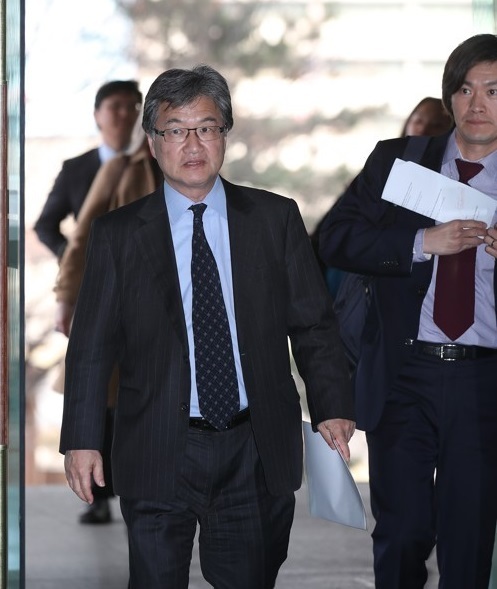US Secretary of State Rex Tillerson has delivered a strong message to China that it is "uncalled for" for Beijing to retaliate against the ongoing deployment of an advanced missile defense system in South Korea, a senior US official said Wednesday.
Tillerson visited Beijing over the weekend and held talks with Chinese President Xi Jinping and Foreign Minister Wang Yi to discuss key pending issues of mutual concern. The US diplomat chief wrapped up his first Asian tour since taking office, which also took him to Japan and South Korea last week.
 |
US nuclear envoy Joseph Yun (L) meets with his South Korean counterpart Kim Hong-kyun in Seoul on March 22, 2017. (Yonhap) |
"I had a chance to discuss (with China) the shape of our review on North Korea, which is ongoing, as well as the strong points that the secretary delivered both here and in Beijing on THAAD," Joseph Yun, the top US nuclear envoy, said at the start of talks with his South Korean counterpart Kim Hong-kyun. He came to Seoul from Beijing where he held talks with senior Chinese officials.
"The secretary conveyed it very strongly to the Chinese side and the secretary also said in private meetings that really retaliating against a defensive system which China has done was something that was uncalled for and something of a growing concern for us. So I believe those points were well delivered by the secretary," he added.
China has been stepping up its economic retaliation against South Korea as it and the US went ahead with their plan to install a THAAD battery on the peninsula to better counter threats from the North. Beijing has objected to the plan, saying the powerful radar system will hurt its strategic security interests.
In his press conference in Seoul on Friday, Tillerson called on China to refrain from retaliating against South Korea over THAAD, saying that it is "inappropriate" and "troubling." He also stressed that the missile shield is for defensive purposes, not targeting anything other than missiles coming from the North.
Tillerson, however, didn't seem to mention much about the THAAD issue during his stay in Beijing, raising speculation that he might not have delivered a clear warning against the ongoing economic retaliation zeroing in on South Korean businesses.
Yun's trip to Seoul comes amid growing concerns over North Korea's additional provocations and mounting calls in Washington for stepped-up sanctions to starve Pyongyang of hard currency that could be exploited to advance its missile and nuclear programs.
The North test-fired four ballistic missiles early this month and Pyongyang announced Sunday that it tested a new high-thrust rocket engine, raising speculation for provocations in the near future.
In what appears to be the latest provocation, the North test-fired a missile from its east coast that appears to have failed, Seoul's defense ministry said earlier in the day.
After completing his talks with Kim, Yun said that he heard about the latest missile test, saying it hurts ongoing global efforts to tackle the nuclear stalemate.
"It is not helpful at all. These are tests that have been banned by the UN Security Council resolutions, so it's not very helpful," he said.
Asked if Washington considering a secondary boycott intended to penalize third-country firms doing business with the North in an effort to force Beijing to pressure Pyongyang, he said, "Those are all things we need to study."
 |
Joseph Yun, the top US nuclear envoy (Yonhap) |
Meanwhile, during the talks with Kim, Yun emphasized the strong alliance and close communication between South Korea and the US, citing Tillerson's recent visit and the forthcoming trip to Seoul by Vice President Mike Pence.
"I think that shows the highest level of engagement that we have done. I want to thank you on your part also making sure that the alliance relationship and our approach to North Korea is very closely coordinated," he said.
Kim noted that Tillerson made a "very clear and strong statement" in Seoul last week on the "ironclad" alliance with South Korea, the "maximum level" of sanctions against the North and China's "inappropriate" economic retaliation over THAAD.
In a press release after the talks followed by a meeting over lunch, the foreign ministry said that the two condemned in unison the North's continued provocations, including the latest one on Wednesday, and agreed to step up the economic and diplomatic isolation of Pyongyang going forward.
They also reconfirmed that it is not the right time to hold talks with the North given that it continues to carry out provocations, rather it is the time to apply more pressure on its regime until it changes its calculus. Yun delivered that position shared by Seoul and Washington during his trip to Beijing, the ministry said.
A diplomatic source quoted Yun as saying during the talks in Seoul that he and his Chinese counterpart Wu Dawei shared that it is premature to seek negotiations with the North. Yun added that Tillerson also made it clear in Beijing that Washington will not hesitate to punish any Chinese firms for illegal transactions with the North, according to the source. (Yonhap)









